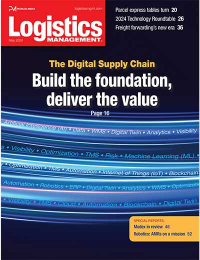Father of Robotics Joseph F. Engelberger dies at 90
Brooklyn-born 'Henry Ford of robotics' pioneered robots in industrial, automotive manufacturing and healthcare applications.
Latest Logistics News
UPS announces CFO Newman to leave company, effective June 1 Preliminary April North American Class 8 net orders are mixed Senators take a close look at Amazon with Warehouse Worker Protection Act Despite American political environment, global geopolitical risks could be easing Maryland DOT: $1.9 billion and up to four years to rebuild bridge sunk near Baltimore port More NewsJoseph F. Engelberger, an engineer and entrepreneur who pioneered the robotics field, died peacefully at his home on the morning of December 1, 2015, in Newtown, Conn.
Engelberger – widely known as the “Father of Robotics” and creator of the world’s first industrial robot – revolutionized modern industrial and automotive manufacturing processes and went on to establish robotics in human services. Engelberger was 90 years old.
Born July 26, 1925 in Brooklyn, New York, Engelberger earned a bachelor’s degree in physics and a master’s degree in electrical engineering from Columbia University. An industry advocate, author, and international ambassador for robotics, Engelberger founded Unimation, Inc., in 1956, the world’s first industrial robotics manufacturer. Working closely with inventor George Devol, he developed the first industrial robot in the U.S., called “Unimate”, which was installed for industrial use in a General Motors plant in 1961. Since then, approximately three million industrial robots have been installed in manufacturing facilities around the world.
“Joe made some of the most important contributions to technological advancement in the history of the world,” said Jeff Burnstein, president of the Robotic Industries Association (RIA), the first and only robotics trade association and an organization Engelberger was instrumental in founding. “Because of Joe, robotics became a global industry. He was years ahead of his time, envisioning robots based on insects and birds decades ago –– developments that we’re finally seeing today. His question, ‘Do you think a robot could do that?’ inspired researchers to answer ‘yes’ and develop the amazing robotics applications found worldwide today.”
After selling Unimation to Westinghouse, Engelberger’s focus shifted from industrial robotics to robotics in human services. Through HelpMate Robotics, Engelberger developed HelpMate, a robot hospital courier currently used in hospitals worldwide as well as spearheading development of robotic applications to assist in care for elderly and disabled individuals.
Engelberger’s industrial applications fundamentally changed the automotive manufacturing sector, introducing robotics that enabled manufacturers to achieve greater efficiency and precision with the use of robotic arms on assembly lines. The innovations Engelberger introduced were a major factor in the rise of the Japanese auto industry, where the use of robotics was enthusiastically embraced in the post-war era.
Engelberger was inducted into the U.S. Manufacturers Hall of Fame in 2009. The RIA named its prestigious annual award the Joseph F. Engelberger Award in recognition of his outstanding contributions to the field of robotics. Other honors Engelberger received over the course of his career include induction into the National Academy of Engineering and the Connecticut Academy of Science and Engineering. Engelberger’s books, Robotics in Practice and Robotics in Service, are considered seminal texts on robotics and have been translated into multiple languages and distributed worldwide.
Engelberger won numerous major awards honoring his pioneering efforts in the robotics, including the Society of Manufacturing Engineers’ Progress Award, the Nyselius Award from the American Die Casting Institution, the Leonardo da Vinci Award from the American Society of Mechanical Engineers, the American Machinist Award, the Golden Omega Award at the Electrical Electronics Insulation Conference, the McKechnie Award from the University of Liverpool, the Egleston Medal from Columbia University, the Beckman Award at the LabAutomation Conference, and the Japan Prize.
Profiled in the London Sunday Times as one of the “1,000 Makers of the 20th Century”, Engelberger has received honorary doctorates from the University of Bridgeport, Briarwood College, Spring Garden College, Trinity College, and Carnegie Mellon University.
“Joe was the Henry Ford for the robotics business and a tremendous international ambassador,” said Don Vincent, past RIA president. “It was Joe’s personal drive and commitment to make forming Robotics Industries Association a reality along with his pioneering talents that convinced his competitors that RIA was needed for the future of manufacturing.”
The RIA has written “A Tribute to Joseph Engelberger” that can be found here. To read the RIA obituary listing, visit this link.

Article Topics
Latest in Logistics
UPS announces CFO Newman to leave company, effective June 1 Preliminary April North American Class 8 net orders are mixed Senators take a close look at Amazon with Warehouse Worker Protection Act Despite American political environment, global geopolitical risks could be easing Maryland DOT: $1.9 billion and up to four years to rebuild bridge sunk near Baltimore port April Services PMI contracts after 15 months of growth, reports ISM 2023 industrial big-box leasing activity heads down but remains on a steady path, notes CBRE report More LogisticsSubscribe to Logistics Management Magazine

Find out what the world's most innovative companies are doing to improve productivity in their plants and distribution centers.
Start your FREE subscription today.
May 2024 Logistics Management

Latest Resources














